1. The new laptop
To those who have asked, it's a Dell Latitude D810 with a wide screen. Even though the screen is wider, it's not as high-res as my previous laptop, so there's less real estate on my Windows Desktop, and the fonts don't look as smooth. But fonts and pictures are
bigger, so it's much easier on the eyes. Already I'm not squinting as much.
I mentioned that getting a new computer is a drawn-out, high-stress ordeal for me. Unlike almost everyone else I know, I simply
cannot start with a factory-installed version of Windows and add individual applications as I use them over a period of many weeks. I have this obsessive need to install all my software up front, set every program's options as nearly as possible to the same settings I had on the old computer, and make sure all my data, directories, and utilities are in exactly the same places they were on the old computer. Until then, I can't use the computer very productively.
One of the first things I do with a new computer is systematically uninstall and delete most of the factory-installed, space-wasting promo-ware, free trial software, and useless utilities that always come pre-loaded on a new computer. It's not that I need the space; I just despise the clutter. That gives you an idea of how finicky I am when it comes to setting up a new computer—and why it's at least a two-day process.
What's "new" about the new computer when Phil is finished with it? you may wonder. Well, I always change the wallpaper. And of course, I appreciate the higher speed and many additional features that come with every new computer. I also take the opportunity while reinstalling to make sure I have all the latest upgrades and drivers for everything. But I still want the new computer's directory structures, start menus, and program selection to work as much like the old one as possible.
For that reason, I'm still using a directory structure that had its genesis on the first IBM-PC I ever owned, back in the days of DOS 1.0.
As a matter of fact, I began using a personal computer for writing and editing in 1981, about 6 months before the start of the PC era and the rise of Bill Gates. My first computer (a NEC pc-8001) used an operating system called CP/M, which was very crude but quite efficient. CP/M was similar to DOS; in fact, a lot of DOS features were borrowed directly from CP/M. When you booted your computer, you got a C:> prompt; nothing more.
I
still like C:> prompts and command lines. I'm comfortable with them. I
prefer to be in control of the computer as opposed to having it control me. I also still do a lot of file-management stuff in a DOS window, using some of the same DOS utilities I've used for two decades. For that reason, I still name most of my files and directories with eight-character-or-less words, using (at most) a single three-letter filename extension.
Oh, and my favorite word processor is
still WordPerfect 5.1 for DOS. I run it in a DOS Window, and use it ten times more than any other word processor or text editor. In fact, I use it
exclusively when I'm dealing with book-length editorial projects.
So you
know I'm not going to let a professional IT guy install my software for me. I appreciate what those guys do, but I want my computer set up the way
I want it, as lean and mean as possible.
Incidentally, the two go-to guys for IT help at Grace to You are Bill and Ted.
No, I'm serious. Bill Fickett (one of the organization's key departmental directors) is a supremely competent guy who is more knowledgeable about the latest software and technology than anyone I know. Ted Ng, our main computer-support guru, can quickly fix most software and hardware problems. And if he can't fix it, he'll find out how. It's Ted's job to install software for everyone
but me (and Bill, I suppose). I had to get Ted to bail me out about four times this week. I consulted Bill's expertise only once or twice.
(Bill has had a family medical crisis this week, involving his son Cooper. Thankfully, the worst seems to be over, and Cooper is home from hospital.)The only major glitch in all my software reinstalls came when Libronix (formerly "Logos Bible Study Software") stubbornly refused to run after installation, re-installation, and several tweaks and re-installations. I tried every remedy suggested on the FAQ at their website. Didn't help. A quick call to their support line got the issue resolved pretty easily. I think I made only one other support-line call, to Adobe, because my serial number for Adobe Audition (my sound-editing software), was an upgrade number, so Audition insisted that I reinstall the original version of CoolEdit that I upgraded from, and then go through the upgrades again. I have a few programs that require such a process. (It strikes me as sheer folly to make reinstalls so difficult for users.) In other cases, I have been instructed to save old versions in case reinstallation is ever necessary. But when I upgraded from CoolEdit to Adobe, the new software had no warning about keeping old versions, so I threw away my original CoolEdit programs two years ago, when I upgraded. That's just one example of the kind of thing that makes reinstalling software so intensely frustrating, but the Adobe customer service guy was friendly, helpful, and understanding—and he managed to work out a solution for me, even though it took about 30 minutes to do so.
Anyway, I've got the new computer pretty much all set up now. (There are just a couple of lingering issues Ted will have to help me resolve.) This is my first official blogpost from the new computer, and I already like it. The old laptop (a Dell Inspiron) had a flimsy feel and a noisy exhaust fan. This one looks and feels more solid; it is screamingly fast; and it's refreshingly quiet. Darlene refuses to let me have coffee while I'm using it.
Now I'm already planning for my next new computer, which will probably be a wholesale replacement of the main computer here at home. We have a monster antique desktop Gateway that still runs Windows 95, and I intend to take 3 days off work and replace it sometime in the next two months. When that happens, I'll also finally have high-speed cable access installed at home, with a wireless network to simplify life for everyone in the family.
They can't wait. I'm already dreading the process again.
2. Roast PyroManiac au Jus
I returned to the blogosphere this morning to find that I'm getting savaged on one of my favorite blogs:
Triablogue.Jonathan Felt, posting as "Jus Divinum," does a pretty fair imitation of the encyclopedic style and long-winded form of Steve
"Purple" Hays ("'Scuze Me, While I Diss This Guy").
As if Triablogue
needed more long, text-heavy posts.
No, seriously, Triablogue
is one of my very favorite blogs, and I normally agree with Steve Hays. But not on the issues of Christian Reconstruction and the church's duty with regard to the political arena.
Anyway, so far, "Jus Divinum" seems like more of a one-issue guy than Steve Hays. He's passionate about evangelical political activism, and he rarely misses an opportunity to defend the politics and strategies of the American Religious Right. Since I have on occasion expressed concerns about American evangelicalism's obsession with trying to address spiritual problems through political lobbying,
I have heard from Jus on this matter before.(For the record, I think both Scripture and history teach us that forays into secular politics are dead-end detours for the church of Christ. I've already indicated that I plan to post more on this issue, and I'm beginning to think it will probably be a time-intensive discussion.)
This time, Jus dissects an article I wrote a few months ago for
the Shepherds' Fellowship. Steve Camp
posted it on his blog yesterday (thus sucking me into the vortex of my second accidental controversy in what was
supposed to be a slow week).
The original article was part of a series of rants I have written in response to some of the pet themes one finds in
Christianity Today. In this particular one, I was critical of Chuck Colson's incessant pleas for "cultural engagement," pointing out that in Colson-speak, that involves ecumenical political activism.
Jus has replied to my rant with an eight-page post elegantly titled
"Neo-Pietism or Ostrich Evangelicalism." You can easily read it for yourself if you have a few spare hours. No need for me to rehash it line by line.
But here's the Cliff's Notes version of Jus's argument: He points out that in
the Christianity Today column I was replying to, "Colson never
once mentions the need for ecumenical political alliances." Jus even describes my link to "Evangelicals and Catholics Together" as "gratuitous." He thinks I am being unfair and uncharitable to Colson to read the issue of ecumenical politics into Colson's plea for "engaging the culture."
Oh, puleeeeze. Who is taking the "ostrich" approach, here?
Colson's campaign for ecumenical activism has been his dominant message for more than a decade. It was the central point of his book
The Body. It was the main motivation behind "Evangelicals and Catholics Together" (ECT), which Colson co-authored. ECT expressly defines "the Christian mission"—including the engagement of "culture"—in a way that focuses specifically on the issues of law, politics, and public policy. ECT also deliberately and pointedly downplays the significance of Catholic-Protestant differences on the core issues of the gospel. And then it calls for ecumenical cooperation in the political arena (arguing, in effect, that the church can better fulfill her "mission" if both Evangelicals and Roman Catholics forget about our soteriological differences relative to the gospel and focus instead on the moral and political issues where we ostensibly
do agree).
It should be plain to most readers that both Colson's column in
CT and my response are part of a much larger context. One would have to be willfully obtuse or incredibly naive to argue with any degree of seriousness that Chuck Colson's plea for engaging the culture has nothing to do with the ecumenical strategy he has laid out in multiple books and documents over the past decade or so. Since I don't believe Jus is either obtuse or naive, I have to wonder if he's just arguing for sport.
In the several times Jus has engaged me on this issue, he has never actually attempted a heartfelt defense of the pragmatic ecumenism that in fact
does dominate the Religious Right. His argument, pretty consistently, is that he sees no necessary reason why ecumenism and pragmatism
must go hand in hand with political activism. He'll point out that
this person doesn't practice ecumenism, and
that person didn't explicitly call for ecumenism
in that particular context, so why is politically-motivated ecumenism such a major concern of the
PyroManiac's?I've pointed out repeatedly in reply that the kind of ecumenism I'm concerned about is a
fact, not a groundless or superstitious fear held by those of us who don't think political activism ought to be moved higher up on the church's agenda.
As I said in an earlier post, the evangelical political right has
historically—not just theoretically—fostered an ecumenical drift.
Until Jus addresses
that issue, all his other niggling arguments have no real traction. So far
he has compared politics to dentistry, posted
a long, impassioned defense of someone I didn't even criticize, and now devoted
eight pages to a desperate attempt at obfuscating what is really a simple, straightforward, rather obvious point: Chuck Colson strategy for political activism has ecumenism at its heart.
And if Jus seriously thinks ECT is not germane to Colson's master plan for "cultural engagement," he ought to read
the document itself.














 The following post, and some of the material that will follow in subsequent posts, has been adapted from one of my messages at the 2005 School of Theology at the Metropolitan Tabernacle in London last month
The following post, and some of the material that will follow in subsequent posts, has been adapted from one of my messages at the 2005 School of Theology at the Metropolitan Tabernacle in London last month


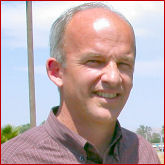



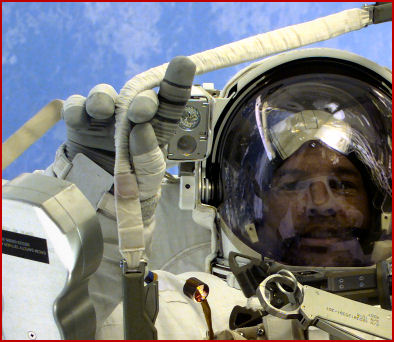
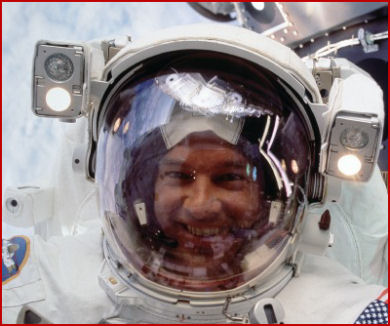
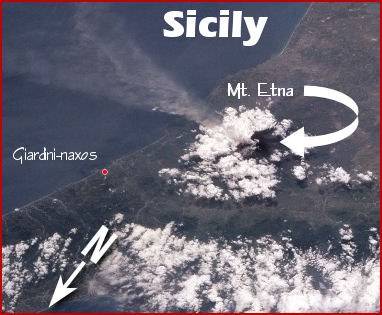
 To those who have asked, it's a Dell Latitude D810 with a wide screen. Even though the screen is wider, it's not as high-res as my previous laptop, so there's less real estate on my Windows Desktop, and the fonts don't look as smooth. But fonts and pictures are bigger, so it's much easier on the eyes. Already I'm not squinting as much.
To those who have asked, it's a Dell Latitude D810 with a wide screen. Even though the screen is wider, it's not as high-res as my previous laptop, so there's less real estate on my Windows Desktop, and the fonts don't look as smooth. But fonts and pictures are bigger, so it's much easier on the eyes. Already I'm not squinting as much. I returned to the blogosphere this morning to find that I'm getting savaged on one of my favorite blogs:
I returned to the blogosphere this morning to find that I'm getting savaged on one of my favorite blogs:  I got the new computer about noon Tuesday. The process of simply transferring my data took the entire rest of the day. In fact, I didn't actually finish. I left the two laptops at the office overnight, copying data from the old one to the new one across the network. I thought I'd get back to the process first thing Wednesday morning and start actually installing some programs.
I got the new computer about noon Tuesday. The process of simply transferring my data took the entire rest of the day. In fact, I didn't actually finish. I left the two laptops at the office overnight, copying data from the old one to the new one across the network. I thought I'd get back to the process first thing Wednesday morning and start actually installing some programs.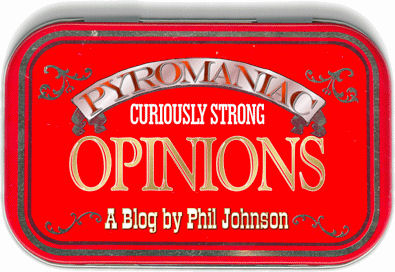

 It was August 10, 1989. Darlene and I and the boys were on vacation. It was a warm day but not too hot. We were sitting in the front row of the left-field bleachers in Wrigley field. The Cubs were playing the Phillies.
It was August 10, 1989. Darlene and I and the boys were on vacation. It was a warm day but not too hot. We were sitting in the front row of the left-field bleachers in Wrigley field. The Cubs were playing the Phillies.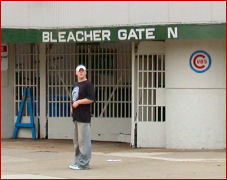 On our first day in Chicago, we had standing-room only tickets on the third base side, far back under the canopy. The boys stood transfixed and paying close attention through the whole game. And the Cubs moved into first place in the pennant race that day.
On our first day in Chicago, we had standing-room only tickets on the third base side, far back under the canopy. The boys stood transfixed and paying close attention through the whole game. And the Cubs moved into first place in the pennant race that day.
 Now that moment is frozen in my mind, and I have often recalled it, because that particular moment was one of the most perfect moments of my life. I was on vacation—no pressure. My kids were loving it. My wife was especially beautiful in the outfield sun. A heroic aura seemed to surround me. The Cubs were comfortably out in front, and we had front-row bleacher seats on a day when the weather was as close to heaven as Chicago ever gets.
Now that moment is frozen in my mind, and I have often recalled it, because that particular moment was one of the most perfect moments of my life. I was on vacation—no pressure. My kids were loving it. My wife was especially beautiful in the outfield sun. A heroic aura seemed to surround me. The Cubs were comfortably out in front, and we had front-row bleacher seats on a day when the weather was as close to heaven as Chicago ever gets. 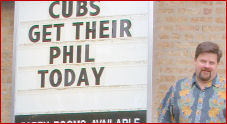 I said, "This is a perfect day. We've got perfect seats at the perfect game on a perfect day. The Cubs are in first place. They're way out in front in this game. The weather is perfect. Nothing will ruin this day."
I said, "This is a perfect day. We've got perfect seats at the perfect game on a perfect day. The Cubs are in first place. They're way out in front in this game. The weather is perfect. Nothing will ruin this day."

 At the urging of several people, I'm posting this brief reply to the accusations Richard Abanes has made against John MacArthur in
At the urging of several people, I'm posting this brief reply to the accusations Richard Abanes has made against John MacArthur in 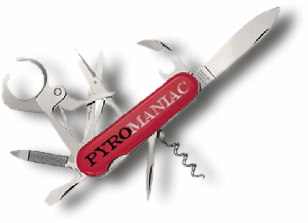
 Some people actually watch the undulating waves of fads in the evangelical movement as if these were the best barometer by which to discern how the Holy Spirit is working in the world. Many evangelical leaders actually seem to think the fads are a better gauge than the Word of God for giving us a perspective on what God wants to do in His church from season to season.
Some people actually watch the undulating waves of fads in the evangelical movement as if these were the best barometer by which to discern how the Holy Spirit is working in the world. Many evangelical leaders actually seem to think the fads are a better gauge than the Word of God for giving us a perspective on what God wants to do in His church from season to season.